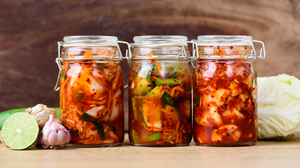These days, there can’t be many of us who do not know what it is like to live with everyday stress.
A heavy workload, raising children, studying, the general stresses of maintaining personal and professional relationships… it all takes its toll.
And that is without factoring in those one-off events such as weddings, divorces and house moves.
A 2021 study reported that 74% of us have felt so stressed lately that we have become overwhelmed or unable to .
It is little wonder, with stressors that are out of our control - a global pandemic and increasing concerns about the environment (so prevalent now that experts have coined the phrase ‘eco-anxiety’) – now piled on top of the everyday worries of the average adult.
When the negative effects of everyday stress become long term or chronic, our immune system can be first to take the .
It is a vicious circle too; you catch every bug going, find it hard to shift even the mildest sniffle and as a result, it is harder to get things done.
Your concentration reaches an all-time low and, honestly, all you want to do is curl up under a blanket, with a trashy Netflix series and a steaming hot cuppa.
How stress affects immunity
When we experience the long term effects of everyday stress,, our body is less able to fight off antigens, the viruses, bacteria and chemicals that cause an immune response.
Yep, that idea of being run-down is not all in your head - being stressed really does make us more prone to becoming ill.
Stress, lifestyle and immunity
When we become stressed what do many of us do? Reach for a bar of chocolate or a glass of wine?
We might put off making a healthy dinner in favour of an easy takeaway. Perhaps the weekly gym session or evening jog gets tabled for another time. And as for sleep, that is interrupted by those thoughts that we just cannot stop whirling round and round in our heads.
We all have coping strategies. However, poor diet, alcohol, smoking, a lack of exercise and low-quality sleep can all have a negative effect on our immune .
Stress and the gut
You have probably felt stress in your gut at some point. In some cases, stress can slow digestion, causing constipation and bloating.
Some people find that their digestive system works on fast forward during challenging times, resulting in more frequent and more urgent loo visits.
For many, appetite changes may occur and the symptoms of digestive conditions such as IBS (irritable bowel syndrome) can worsen.
Stress, and some of the mechanisms we might use to cope with it, can have a serious potential effect on our gut micro too.
Scientific studies have shown that putting ourselves under stress can reduce the number of beneficial bacteria living in our gut. This can have further implications on our immunity because, guess what? The good bacteria in our gut are important for our immune function.
How do gut bacteria support the immune system?
Around 70% of the immune system is located in the gut.
Not only are many of the cells required for immunity present in the digestive system, but the lining of the intestine – also known as the intestinal epithelium – is a vital part of immunity too.
This of cells can trap pathogenic and can secrete peptides that communicate with white blood cells, telling them to protect us from harmful microbes .
A healthy and diverse gut microbiome is essential to ensure that this system works effectively. Beneficial bacteria in the gut help to protect against pathogens by competing for nutrients and colonisation sites, producing metabolites that support the gut barrier function, and gut bacteria interact and influence the immune system right from birth.
Looking after your gut bacteria
When the levels of beneficial bacteria living in our gut are hammered by stress, one idea to counter this is to eat foods or take supplements containing live bacterial cultures that can survive transit through the gut.
Choosing a supplement formulated for immune system support, such as PrecisionBiotics®Immune, while also providing a healthy dose of vitamin D3, essential for strong immunity.
Are live culture supplements better than foods?
When it comes to cultures, we are living in exciting times.
Never before have the supermarket shelves been more laden with fermented foods containing live bacteria, from kefir to kombucha, sauerkraut to soy ferments.
While these foods can be beneficial, these products do not list the strains they contain nor how many, so it can be tough to know which strains of bacteria are contained within them and also whether any of these bacteria can survive through the gut.
Discover more about Mental Wellbeing

Get Back to it with PrecisionBiotics
After the summer holidays it can be hard to go back to school, uni or work. Find out our top tips here.

Instant stress relief
Do you need quick stress relief? Read our blog to discover these instant stress relievers.

The benefits of stress: Is it possible to turn stress to our advantage?
Research suggests there are actually benefits of stress, find out the advantages to stress here.
Related Articles









